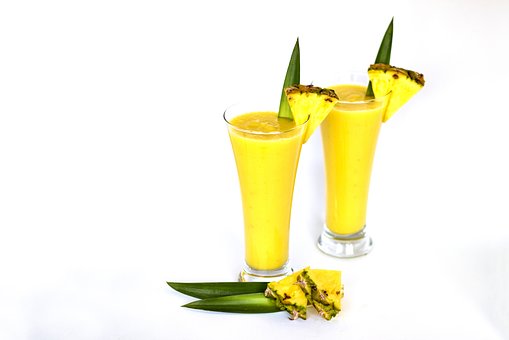Pineapple juice for cough relief: Does it work?
Coughs are a common ailment, and many people look for simple and natural treatments to relieve them.
Home remedies containing pineapple juice are sometimes used as an alternative to cough medicine. But is pineapple juice effective for cough relief?
Natural remedies for common ailments are often made popular by alternative medicine blogs and websites. However, claims about the effectiveness of these treatments are sometimes made without much or any scientific evidence.
This article explores the health benefits of pineapple juice and the scientific evidence to support using it as a cough treatment. It also looks at other cough remedies to help people decide which is the right option for them.
Can pineapple juice relieve a cough?
Many communities use natural remedies as an alternative to over-the-counter medicine. For instance, the Amish community has traditionally used a remedy containing pineapple juice to treat coughs.These types of home remedies have reached a wider audience in recent years. Some websites claim that pineapple juice is five times more effective at treating a cough than cough medicine. But is this true?
While there is some medical research around pineapple juice, there is a need for more evidence of its effectiveness, as a cough remedy.
Pineapple juice is commonly known as a lytic agent, meaning it helps thin out mucus, so it is easier to move with coughs.
One review, published in 2010 by researchers at an institute in India, has been cited in other articles, as evidence that pineapple juice is an effective cough treatment. However, the article focuses on tuberculosis rather than cough treatment.
The peer-reviewed article mentions that a mixture of pineapple juice, salt, pepper, and honey can help dissolve mucus in the lungs of people with tuberculosis.
However, it is unclear from the study whether this finding was central to the research. As such, it is hard to rely on this finding to support the claims made about pineapple juice, as an effective cough remedy.
This does not undermine the experiences of those who have personally found pineapple juice helpful in relieving a cough. It just means that further research is needed to prove it is effective.
Health benefits of pineapple juice
While the effectiveness of pineapple juice as a cough remedy is still in question, it does have nutritional properties that suggest it may help reduce cough symptoms.Pineapple juice contains bromelain, a type of enzyme that research shows to have anti-inflammatory and pain reducing properties.
Bromelain may help relieve symptoms of asthma and other respiratory problems, as well as break down mucus. Another study shows bromelain to have the potential to help fight cancerous cells.
Bromelain is not known specifically to relieve a cough, but because of these other properties, it may help reduce some cough symptoms. It will still depend on the cause of a cough, however.
When considering the health benefits of pineapple juice, it is helpful to remember that it also contains:
- high levels of vitamin C to support the immune system and eyesight
- some fiber to help digestion
- manganese, which helps prevent cell damage and aging
- the anti-inflammatory properties of bromelain
- beta carotene, copper, zinc, and folate, which can boost fertility
Pineapple juice cough remedy recipes
If someone is keen to try pineapple juice as a home cough remedy, there are recipes they can try. Here are two simple ideas to get started.Traditional pineapple cough remedy
The most common pineapple juice remedy, and the one included in the often-cited Indian research study, uses a few simple ingredients.To make this traditional pineapple cough remedy at home, combine:
- 1 cup pineapple juice
- pinch of salt
- pinch of pepper
- 1 1/2 tbsp honey
It is also important to drink around 8 glasses of water every day to assist the mucus in moving and breaking down.
Pineapple cough remedy with a kick
This recipe builds on the traditional pineapple cough remedy mixture
with the addition of cayenne pepper and ginger for a spicy kick.
To make this remedy at home, mix the following ingredients in a blender:
To make this remedy at home, mix the following ingredients in a blender:
- 1 cup pineapple juice
- pinch of salt
- pinch of pepper
- 1 1/2 tbsp honey
- 3 inches ginger root
- 1/4 cup lemon juice
- 1/2 tsp cayenne pepper
Other home remedies for coughs
People can consider other remedies to help reduce mucus if they are
allergic to pineapple, trying to limit their sugar intake, or just do
not like the taste of pineapple juice.
There are other natural foods and drinks that may help relieve a cough or soothe symptoms. These include:
There are other natural foods and drinks that may help relieve a cough or soothe symptoms. These include:
- Hot water with lemon juice and honey: Honey can soothe the throat and lemon has natural anti-bacterial properties.
- Warm soup: This can be soothing and comforting, and may help reduce the discomfort of cough symptoms.
- Spicy foods: The chemical capsaicin found in some spices can help thin out mucus. This helps people clear their chests and blow their noses more easily.
- Ginger tea: This is soothing and may reduce inflammation, as ginger contains natural anti-inflammatory qualities.
- Lots of fruits and vegetables: Fruits and vegetables that are rich in vitamin C can help boost the immune system, meaning that a person can better fight a cold or cough.
Things to avoid
Some things are best avoided when a person has a cold as they can make symptoms worse. These include:
- Coffee: Avoid coffee and other drinks containing caffeine as they can be dehydrating.
- Cigarettes and secondhand smoke: Steer clear of cigarette smoke, as it irritates the throat and lungs.
- Dairy: Dairy products should be avoided, as they can add to mucus production.
-
Fried foods: It is best to avoid fried foods as they can irritate the throat.
Traditional cough remedies
If someone has a bad cold or cough, they may find that home remedies are not enough to relieve their symptoms. Speaking to a doctor and trying traditional medicine is typically the best option if this is the case.
Over-the-counter cough remedies include:
- Antitussives medicines: These suppress a cough.
- Expectorant medicines: These thin out mucus so that it can be expelled more easily with a cough.




.jpeg)



.jpeg)

